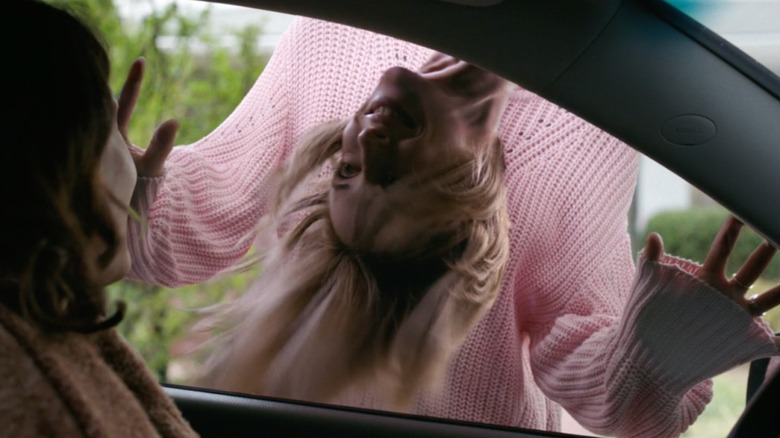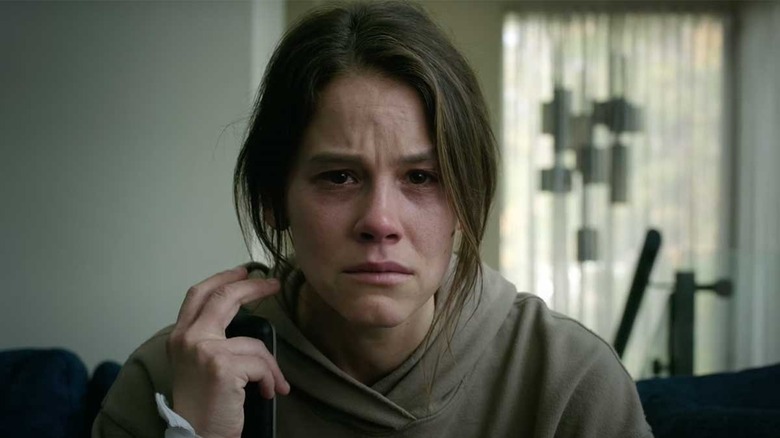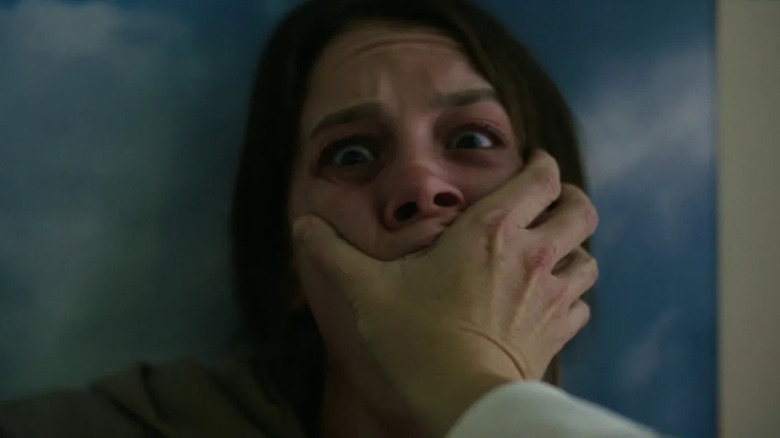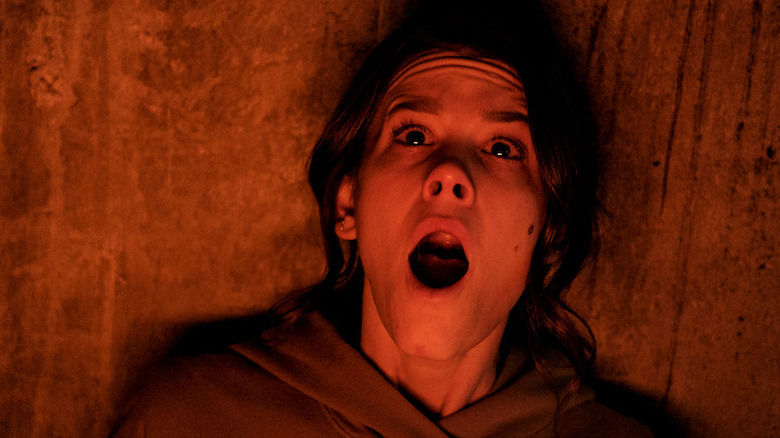Smile Continues Modern Horror's Obsession With One Key Theme, For Better Or Worse
Warning: spoilers for "Smile" ahead.
"Smile" is a good movie. It also doesn't have an original bone in its body, but director Parker Finn cooks some familiar ingredients well and turns out a sturdy debut feature.
The "Smile" demon, which kills it victims after a week and which you can only escape by propagating it further, calls to mind "The Ring" and "It Follows." Sosie Bacon's cursed heroine Rose Cotter also owes a lot to Helen Lyle (Virginia Madsen) from "Candyman" — a competent professional whose life and relationships crumble from the stress of her haunting.
The demon itself is the latest spin on a familiar allegory: a monster that's really a personification of trauma. The movie tips its hand when Rose visits the one man who escaped the curse, Robert Talley (Rob Morgan). Talley explains that if you don't want to die, you have to kill someone else, then the curse will pass onto the crime's witness. The demon "spreads like trauma."
Calling "trauma" an overused theme in recent horror would be putting it mildly. How does "Smile" fit into the "actually about trauma" canon?
Actually about trauma
Horror is intrinsically allegorical — monsters are often avatars of real-life terrors, from childbirth, foreign invasion, or rampant consumerism. But why has trauma become the go-to answer for what monsters represent these days? It's an easy way to give the lead backstory and add supposed thematic weight. "Trauma" is also a general enough term that stories can be vague and not get into the often ugly and complicated territory of real mental illness.
The "trauma" trend has spread outside horror, showing up in "WandaVision" and "Stranger Things" season 4. With this proliferation, it's not surprising that "actually about trauma" has lost its weight and become a snide joke in film-literate circles.
As for "Smile" itself, what is the trauma it explores? Rose's abusive mother died via drug overdose and the adolescent Rose is the one who found her body. This puts the movie into a subcategory: familial trauma, movies where the protagonist is haunted (literally) by the demons of their parents and which explore how illnesses/traumas run through generations. Others in this category include "Hereditary," "Relic," "Lights Out," and mini-series "The Haunting of Hill House." A shot in the third act of "Smile," where the monster burns in Rose's childhood home, practically recreates a similar "Hereditary" moment.
There's also the inciting incident to considered: Rose inherits the curse from witnessing Laura Weaver's (Caitlin Stasey) death. This also means "Smile" can also be compared to "The Night House" and "Men," which were both about a woman dealing with her husband's suicide.
If you or anyone you know is having suicidal thoughts, please call the National Suicide Prevention Lifeline by dialing 988 or by calling 1-800-273-TALK (8255).
Parental horror
There's an older horror story which makes for a pertinent comparison with "Smile": Stephen King's "Pet Semetary." In that book, the backstory of Rachel (played first by Denise Crosby and then by Amy Seimetz in the two movie adaptations) is that her sister Zelda died from spinal meningitis. Rachel remembers feeling relief at her sister's death and then shame for that relief.
Rose's backstory in "Smile" turns out to be quite similar. When her mother was dying, she called to Rose for help but Rose didn't respond. The movie explicitly says that this is why Rose is a therapist; she can help others when she didn't help her mother. Her sister Holly (Gillian Zisner), on the other hand, has a different coping mechanism: avoidance, choosing to live as a "perfect PTA mom," as Rose puts it.
Rose and Holly's differences aren't revolutionary characterization but they do effectively weld theme and narrative together. Rose's desire to repent also sets the stage for the third act of "Smile" and the movie's biggest deviation from the "actually about trauma" horror formula.
I'll stay with you forever
In the third act of "Smile," Rose drives to her abandoned childhood home so the curse won't be spread. The demon takes the form of her mother, who apologizes for how Rose had to shoulder her burdens. This is part of another recent media trend, described by Vox's Emily St. James as, "the millennial parental apology fantasy," as seen in "Everything Everywhere All at Once" or "Turning Red."
This is also when "Smile" breaks from its contemporaries. Rose rejects the "apology," seems to break the curse, and returns to her ex Joel (Kyle Gallner) with a better understanding of herself. But then Joel starts smiling and promises Rose, "I'll stay with you forever." This line is key. Earlier in the film, Rose's own therapist Dr. Madeline Northcott (Robin Weigert) tells her that sometimes trauma never heals. It appears in Rose's case, this might prove true.
Many "actually about trauma" horror movies opt for more optimistic endings: vanquishing the monster represents the protagonist overcoming their demons. Compare "Smile" with, for instance, "The Night House." The monster in that movie is allegorical for suicidal depression and Beth (Rebecca Hall) beating it represents her choosing to live. Here, though, Rose loses the fight and, possessed by the demon, kills herself and passes the curse onto the real Joel.
This is a more cynical ending for an "actually about trauma" horror movie, but it's just as honest as an uplifting one — sometimes our wounds don't heal and those around us suffer the consequences.
If you or anyone you know is having suicidal thoughts, please call the National Suicide Prevention Lifeline by dialing 988 or by calling 1-800-273-TALK (8255).



